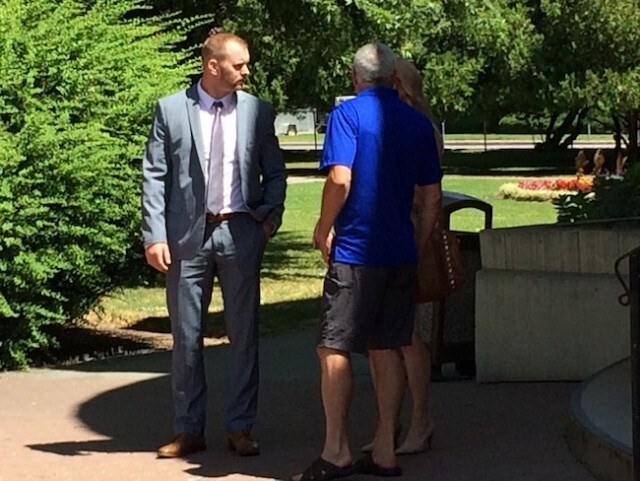A psychiatrist who was assaulted by a patient in Penticton Regional Hospital's psychiatric ward in 2014 continues to have significant mental health issues after suffering a traumatic brain injury during the attack, and says he's been unable to work in the past four years.
Close to seven years after the attack, Dr. Rajeev Sheoran's civil trial against the Interior Health Authority (IHA) began in Kelowna Supreme Court earlier this week. Sheoran alleges IHA was negligent for not providing a safe work environment for him.
Sheoran had also filed a civil suit against Gregory Nield, the man who attacked him, but last month, Sheoran dropped the suit against Nield. On Wednesday (Oct. 6), Sheoran's defence counsel Bill Dick would not elaborate why the suit against Nield was dropped.
The assault in question occurred on the afternoon of Dec. 5, 2014, while Sheoran was performing a psychiatric assessment on Nield. Nield had been admitted to the hospital's psych ward six days earlier. He said he'd been taking psilocybin mushrooms for a full month to treat migraines prior to being admitted to hospital, and he was eventually held involuntarily under the Mental Health Act.
Sheoran was performing the closed-door interview by himself, when “suddenly and without provocation, [Neild] carried out a violent physical attack on him,” Sheoran said in his notice of civil claim.
“The assailant then walked out of the office and advised hospital nursing staff that Dr. Sheoran might be dead.”
The psychiatrist was knocked unconscious in the assault, suffering a broken jaw, nose, teeth and damage to his eye, along with a traumatic brain injury. As a result, he says he continues to suffer from anxiety, depression, post-traumatic stress disorder, insomnia and altered personality.
Sheoran testified Wednesday morning about the challenges he continues to face.
“I don't find that I'm improving. If anything, there are periods that I'm so profoundly disturbed in my mind that I feel it's hopeless, that's how I feel,” he testified.
“I'm also aware that this long a period, the chances of something working, it becomes progressively less and less.”
He said he can barely get through his day-to-day tasks, due to distress, exhaustion, lack of motivation and his “churned up” thoughts. While he tried to return to his work at a psychiatrist sometime following the attack, he now regrets that.
“I cannot be doing that at all. I don't feel safe for my patients, that's a big worry. If I was to sit with a patient, I don't know if I would lose my temper. I'm hyper vigilant, I get so exhausted, and I don't feel confident that I will not say something that will be absolutely unprofessional and inappropriate. And my patients are vulnerable, the most vulnerable patients in medicine,” he said.
“One can't be half a doctor ... Perhaps I shouldn't have gone back to work for a while, I look back and realize that caused me so much distress and pain ... I feel lost.”
But Sheoran said he has no other skills, after dedicating his entire life to psychiatry. He also testified that when the attack occurred, he had very little savings, and lots of debt. His brain injury has left him unable to do much of what he once enjoyed.
“I despise staying at home,” he testified. “I'm a working man, I've always been ... That kind of feeds into a level of guilt. At times I feel shame, I feel worthless.”
Nield was criminally charged over the incident, and in 2017, a jury convicted him of aggravated assault and handed him a 30-month period of probation.
But in 2019, the BC Court of Appeal overturned the conviction, due in part to trial judge Hope Hyslop not allowing Nield's lawyer to admit evidence to support a defence of automatism — where a person is not conscious of their actions. Hyslop retired in the fall of 2017, shortly after sentencing Nield.
The BC Prosecution Service opted not to proceed with a new trial, after receiving “further information” about the case.
In its defence, Interior Health says Sheoran was the one who made the decision to meet with Nield in private, and that the assault was not a result of the health authority's negligence.
"The IHA and its employees at [Penticton Regional Hospital] played no role in the plaintiff's decision to meet with Nield on Dec. 5, 2014, and in particular played no role in the plaintiff's decision to meet with Nield in a closed private room with no other persons present," Interior Health said in its response to the doctor's suit.
"The plaintiff assessed Nield and evaluated the risks to his personal safety and made the decision to meet with Nield in a closed private room with no other persons present."
Sheoran's civil trial is scheduled to run for 39 days. His lawyer would not say Wednesday exactly how much monetary compensation they are seeking from Interior Health, but the amount is expected to be disclosed later in the trial.




